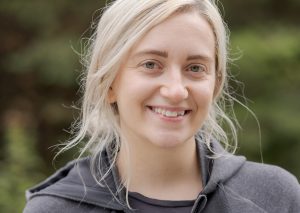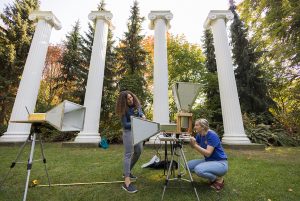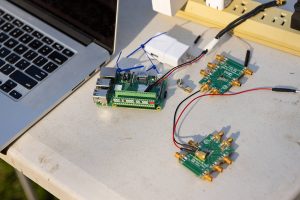Article by Wayne Gillam, photos by Ryan Hoover | UW ECE News

Recent UW ECE graduate Zerina Kapetanovic (Ph.D. ‘22) received the 2022 Yang Research Award for her dissertation focused on enabling low-power communication for environmental sensing systems. She is currently in a year-long appointment as a postdoctoral researcher at Microsoft Research. In September 2023, she will join Stanford University as an assistant professor of electrical engineering.
Originally published in UW ECE’s 2022 Integrator magazine
UW ECE congratulates recent graduate Zerina Kapetanovic (Ph.D. ‘22), who received the 2022 Yang Research Award for her dissertation focused on enabling low-power communication for environmental sensing systems. She developed and applied this research toward improving agricultural methods through the Microsoft FarmBeats program. Kapetanovic received the honor at the annual UW ECE Awards ceremony, which was held June 2 at the Paul G. Allen Center Atrium on the UW campus.
In late August, Kapetanovic also received the UW Graduate School’s Distinguished Dissertation Award in Mathematics, Physical Sciences and Engineering. The award recognizes outstanding and exceptional scholarship at the doctoral level. Kapetanovic earned her bachelor’s, master’s and doctoral degrees from UW ECE, while conducting research on topics such as finding new methods for passive wireless communication under supervision of her adviser, UW ECE Professor Joshua Smith. She is currently in a year-long appointment as a postdoctoral researcher at Microsoft Research. In September 2023, she will join Stanford University as an assistant professor of electrical engineering.
“Receiving the Yang Research Award is exciting. It’s validating that the research I am doing is innovative and impactful, which is a great feeling,” Kapetanovic said. “The grad school award is also a high honor, and I’m really excited to start at Stanford next year. There are many great collaborators there, they have several climate-related initiatives and a new school for sustainability, which is very relevant to my own research.”
The Yang Research Award was established by successful entrepreneur and former UW ECE faculty member Andrew T. Yang. Yang has been one of the most influential people in the electronic design automation industry for nearly three decades, and he is known for being a visionary in both research and entrepreneurship. The purpose of this award is to recognize and encourage outstanding doctoral student research contributions to the field of electrical engineering. The award goes to one qualifying student per year and is open to all doctoral degree candidates in UW ECE. Receiving the Yang Research Award is considered a high honor and helps to create career opportunities for the recipient.
UW ECE mentorship and internships lead to success

Kapetanovic (right) testing her wireless communication device in Sylvan Grove on the UW campus alongside UW ECE doctoral degree candidate Shanti Garman (left). Unlike existing passive wireless and backscatter communication systems, Kapetanovic’s prototype does not depend on a radio signal to send and receive information. Instead, her device uses a byproduct of electrical resistance in its circuitry to enhance energy-efficiency and transmit a wireless signal.
Kapetanovic credits much of her academic success to Smith, who is the Milton and Delia Zeutschel Professor in Entrepreneurial Excellence at UW ECE, a professor in the Paul G. Allen School of Computer Science & Engineering, and head of the Sensor Systems Laboratory at the UW. He is an internationally recognized leader in development of new types of sensor systems with applications in robotics, health care and the Internet of Things (IoT).
“Josh is awesome. I definitely don’t think I would have been as successful as I am without his advice and support,” Kapetanovic said of her adviser. “I think what’s really nice about Josh and the work he does is that he is interested in so many different areas. He looks at things from many perspectives, and that has influenced the way in which I approach my own research.”
In Smith’s lab, Kapetanovic made significant contributions to development of innovative wireless and backscatter communication techniques, battery-free sensors, and inexpensive low-power communication and IoT systems. Throughout graduate school, she worked to apply these new technologies in the real world through her internships at Microsoft, which were supervised by Ranveer Chandra, the company’s managing director for research for industry and chief technology officer of agri-food. Kapetanovic noted that, like Smith, Chandra was a mentor for her throughout graduate school, teaching her ways to look at problems from several different perspectives and encouraging creative approaches to presenting her work. Kapetanovic’s research related to Microsoft’s FarmBeats program — which aims to use collection of precise environmental data, such as soil temperature and moisture level, to help increase farm productivity — gained notice by the company and by the public. In 2020, she was awarded a Microsoft Research Dissertation Grant to help further support her work in this area.
While at UW ECE, Kapetanovic also contributed to paving the way for other female engineers. Along with her lab mate, Shanti Garman, and with the support of UW ECE faculty and staff, Kapetanovic co-organized the inaugural “WomXn at the Forefront of ECE Research (WAFER),” an annual event highlighting outstanding female engineers, which is aimed at cultivating a more inclusive environment. Kapetanovic noted that in Smith’s lab there were several female engineers, and she always felt welcomed and included at UW ECE. But she also said she realized this wasn’t everyone’s experience in electrical and computer engineering, which is a traditionally male-dominated field. So, she co-organized this ongoing event to help ensure inclusiveness at UW ECE over the long-term.
“It has been such a delight to work with Zerina from the time she was an undergraduate through her doctoral degree,” Smith said. “She is fearless about taking on technical challenges, works incredibly hard, and is a wonderful colleague and mentor to other students. I have also been impressed by the entrepreneurial spirit she brings to diversity, equity and inclusion at UW ECE, imagining and implementing successful new programs. I am so excited to watch the next steps in her meteoric rise as she establishes her own research lab as a faculty member at Stanford!”
Preparing for a future at Stanford

Examples of the wireless communication prototype Kapetanovic developed in the lab of UW ECE and Allen School Professor Joshua Smith.
Today, Kapetanovic is looking forward to joining Stanford University. She said that Smith, other faculty and staff in the Department, and in particular, Professor Scott Hauck helped to prepare her for this new faculty role.
“I’ve received support in so many ways at UW ECE that helped to prepare me for the job application process, which also prepared me to start the job at Stanford. I’ve had a lot of great examples around me,” Kapetanovic said. “For instance, Professor Scott Hauck. I really love the way he teaches and being able to learn from him in that regard because I taught EE 271, which is the course that he developed. Having that opportunity at UW ECE helped me to realize more that I enjoy teaching.”
When asked what it was like to mentor and work with Kapetanovic as an educator, Hauck noted her exceptional abilities as a student and as an instructor.
“From the beginning, it was clear that Zerina was something special. At UW ECE, she has been a quiet force, eager to learn and go above and beyond what’s required,” Hauck said. “Toward the end of her UW career, when we needed an EE 271 instructor, we were incredibly fortunate to have Zerina run the class for us. She did an awesome job teaching, just like she has done in everything she has undertaken here. Normally, I’d say that a person would be lucky to land such a great position at Stanford. However, I think Stanford is lucky to have a rising star like Zerina as a new faculty member.”
At Stanford, Kapetanovic’s lab will focus on low-power wireless communication and sensing, and IoT systems. This research work has a wide range of potential applications across many different fields. Kapetanovic said that her lab would be emphasizing sustainable technology and finding ways to apply new innovations to achieve immediate impact — a similar approach to what she did with FarmBeats — while still finding ways to help address major societal issues, such as climate change.
“I’m really passionate about taking these types of technologies and using them to help solve issues related to climate change, but my long-term research goal is to get us to the point where we can actually have battery-free, resilient, and potentially biodegradable sensors that are reliable,” Kapetanovic said. “If you think about all these different types of industries, whether it’s manufacturing or healthcare, agriculture — if you want to improve productivity or make any of those industries more sustainable, you need to rely on data. You need lots of data, and that’s where these sensors come into play and IoT systems in general.”
Kapetanovic is hiring graduate students for her lab at Stanford University. Visit her website for contact information and to learn more about her research.

